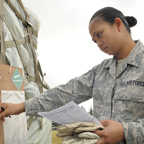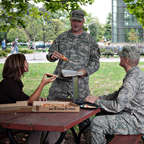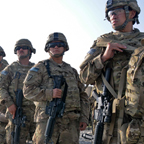The Military Family Research Institute (MFRI) at Purdue University has worked with colleges and universities to strengthen their motivation and capacity to support military personnel and veterans who enroll at their institutions. Through Operation Diploma, grants were awarded to two- and four-year public and private institutions. These grants, and their proceeds, affected the lives of more than 6,000 student service members and veterans.
This series of eight reports, documents the promising practices and lessons learned through Operation Diploma efforts.
Honoring those who serve: Raising campus and community awareness

The first report from the Landscape in Higher Education series highlights promising practices that recognize unique experiences from student veterans and service members. Included are ideas for:
- Creating year-round appreciation of student veterans through various formats.
- Identifying additional meaningful services and acknowledgments that schools can provide.
- Planning programs that foster awareness and recognize student veterans and service members.
Recognizing military training and experience: Ensuring service member and veteran access to higher learning

The second report from the Landscape in Higher Education series describes the unique skills and experiences student service members and veterans acquire during their military careers, which distinguishes them from other students. Higher education institutions vary in their ability to readily serve this population. The report focuses on:
- How schools recognize military training, experience and grant access to educational benefits.
- Ways institutions can acknowledge issues student service members and veterans face in the transition.
- Ideas for attracting and retaining this growing demographic.
Rallying the troops: Enlisting support of faculty, staff and community veterans

The third report from the Landscape in Higher Education series identifies ways student veterans can successfully engage faculty and staff in activities that help them better understand military culture. Suggestions include acknowledging student veterans’ and service members’ unique attributes, expectations and contributions. Professional development can take several forms and true impact requires efforts beyond veterans’ services coordinators. The report includes:
- Additional information for professional development topics.
- Tips for garnering faculty and staff support.
- Ideas for engaging institutional and community leaders.
Appreciating the realities of military service: Higher learning institution policies regarding deployment and GI Bill benefits

The fourth report from the Landscape in Higher Education series gives recognition to the complex nature and demands of military life, including multiple commitments and obligations. Essential for student service members and veterans, this report:
- Explains how colleges and universities can support military service by creating accommodating policies regarding service-related absences.
- Explores why flexibility about military service obligations matters.
- Describes how to help mitigate the challenges of military service and minimize delays in academic progress.
Communicating key policies and programs: Providing useful information for student service members and veterans

The fifth report from the Landscape in Higher Education series is offered to campus leaders and university officials in an effort to reduce the confusion student service members and veterans may experience as they transition to academic life. Offering information in multiple ways recognizes the complexity of the students’ lives and supports the broader audience. Designating a contact person can offer direct, specific information. The report describes:
- Useful methods for information dissemination.
- Website tips for engaging this population of students.
- Benefits of orientation meetings and one-on-one services.
Acknowledging multiple responsibilities: Higher learning institution support services for student veterans and their families

The sixth report from the Landscape in Higher Education series addresses the complexity of student service members’ and veterans’ lives. Like other nontraditional students, they need to balance student, family and work roles, but they also face unique challenges that can make it difficult to transition to campus life. This report analyzes the support systems colleges and universities have in place to address the needs of military and veteran learners, and their families.
Fostering social connections: Supporting academic success by promoting engagement

The seventh report from the Landscape in Higher Education series focuses on building campus connections. The report explains:
- The value of student veteran organizations.
- How student veteran organizations help build support networks among military-affiliated students.
- Promising practices, including the pros and cons of having dedicated space and courses for student veterans.
Specific information for establishing a vibrant SVO can be found in the manual Success in 3-D: How to Design, Develop and Deliver a Thriving SVO.
Demonstrating impact: Designing program evaluations that guide planning and conserve resources

The final report from the Landscape in Higher Education series helps:
- Focus campus efforts for program planning and implementation.
- Explain the importance of establishing specific goals.
- Detail differences between outputs and outcomes in evaluation.
This report also includes tips for engaging student veterans and information about how to make evidence-based decisions. Many programs can be very successful with only modest resources but it is key to plan carefully at the beginning of the process so that efforts can be maximized.
